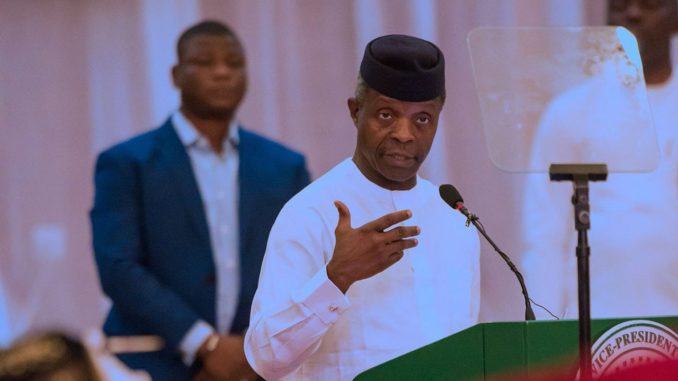
Nigeria’s vice-President Yemi Osinbajo on Monday said whenever he wants to sack a public official found to be corrupt, calls from religious and political leaders reach him not to do so.
Despite this claim by the Nigerian vice-president, it will be recalled that he has been involved in the dismisaal of some government officials alleged to be found corrupt.
While president Buhari was on annual leave, Osinbajo sacked former director general of the Department of State Services (DSS) Lawal Daura.
He was also involved in the suspension of former director general of National Intelligence Agency (NIA) Ayo Oke, and former secretary to the government of the Federation (SGF) Babachir Lawal.
However, while Osinbajo spoke at 24th Nigerian Economic Summit plenary on corruption and rule of law, in Abuja he said the Nigerian elite are often times in the way of getting rid of a corrupt official.
Ngaire Woods, the founding dean of Blavatnik School of Government at Oxford University, who moderated the plenary asked Ossinbajo to tell the summit who called him when he wanted to sack someone corrupt.
Osinbajo said, “I would like to refer to the Nigerian elite, and it’s probably not fair to be that broad, but practically, every segment, because people who have access to you, they could be political leaders, religious leaders, business leaders, whoever has access to you.”
“We have a system where people just feel like, ‘why don’t you just give this guy a break?’ Which again is part of the problem. You don’t get one call, you get several calls,” Osinbajo said.
The vice-president said the Buhari led government was doing much to tackle grand corruption and systemic corruption since assuming office in 2015.
Although some section of the public has criticised the current government’s fight against corruption as witch-hunting of political oppositions, Osinbajo said since he became vice president, he has seen how much impact corruption can have on a country.
Osinbajo, who was commissioner of justice and attorney general in Lagos state for eight years, said one of the most frustrating parts of the fight against corruption for him is the slow pace of prosecution.
He, however, added that the two conviction of former executive governors secured by the federal government has shown that the hand of justice may be slow, but it would yield results.
Osinbajo, also a professor of law, said the federal government has embarked on numbers of law reforms, including the criminal justice reform.
He added that the federal government does not have the constitutional backing to reform state judiciaries.
END

Be the first to comment